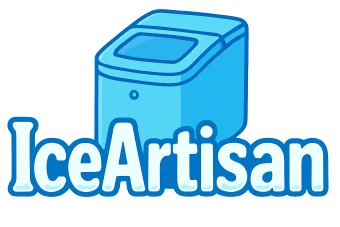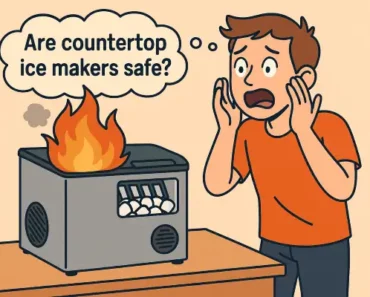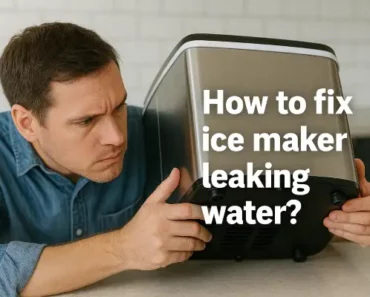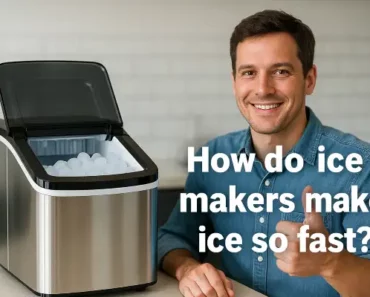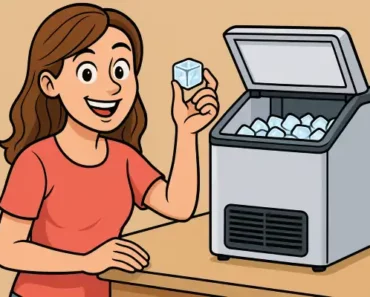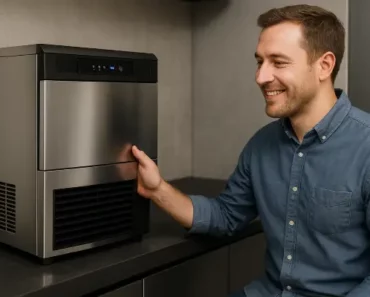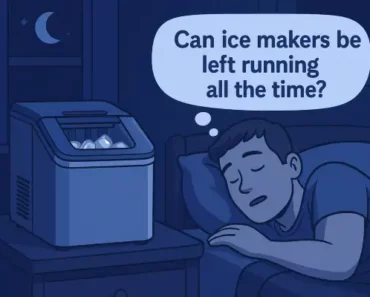Do ice makers need to be drained? You may read my article of “How to drain an ice maker?”, and you find out the process of draining an ice maker is too troublesome, and this today question pops up in your mind.
I find the question mostly from residential homeowners who have a lot of other things require attention. Are you, my precious reader? So today, I will write to help you answer the question as best as possible.
I’ve made a comprehensive “Ice Maker FAQ” series collecting all common ice maker problems to help Ice Artisan readers quickly troubleshoot their ice maker units.
- ⚖️ Countertop vs undercounter ice makers
- 👍 Are portable ice makers worth it?
- ⚡ How much electricity does an ice maker use?
- 💧 Does an ice maker use a lot of water?
- 🪣 Do ice makers need to be drained?
- 🚫 Can ice makers cause water damage?
- 🚰 Do ice makers need water lines?
- 🔊 Are countertop ice makers loud?
- 😭 Do ice makers make a lot of noise?
- 🔗 Are countertop ice makers safe?
- ⛺ Can ice makers be used outdoors?
- 🔌 Can ice makers be left running all the time?
- 🚗 Can ice makers be used in RV?
- 🗄️ Can ice makers be installed in cabinets?
- ❄️ Do portable ice makers keep ice frozen?
- 🛠️ Can ice makers be used in garages?
- 📄 Do ice makers store ice?
- 🚀 How do ice makers make ice so fast?
- 💡 How does ice maker work?
- 🎰 How does a commercial ice maker work?
- 🛠️ How to install an undercounter ice maker?
- ❄️ How to make clear ice in ice maker?
- 🪣 How to increase ice production in ice maker?
- ⏳ How long does an ice maker take to make ice?
- 🔗 When to replace ice maker filter?
- ⏱️ When to replace ice maker?
- 💡 How to clean ice maker?
- 😭 Why does my ice maker smell bad?
- 🫗 How to drain an ice maker?
- 🪣 How to unclog an ice maker?
- 🔗 How do I unstick my ice maker arm?
- 💧 How to fix ice maker leaking water?
- ❄️ Why is my portable ice maker making too much ice?
- 🥵 Why is my ice maker hot?
- 🔌 What happens if you don’t turn off the ice maker?
- 🧊 How to fix ice maker not making ice?
Ice Artisan‘s best picks
Do ice makers need to be drained?
Yes, draining your ice maker is an important maintenance task that significantly impacts both performance and hygiene. Most portable countertop ice makers don’t connect to a drainage system, so it’s highly advisable to drain the whole content inside your countertop ice maker, at least after 3-4 days of use.
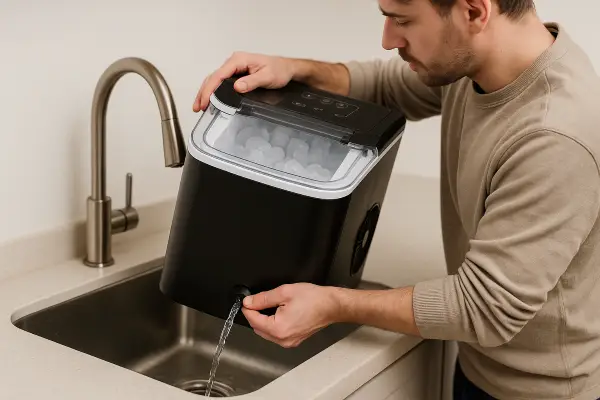
Water stagnation in the reservoir quickly becomes problematic. Left unattended, it creates the perfect environment for bacteria and mold growth, while minerals in your water gradually accumulate as scale deposits. This buildup can reduce your ice maker’s efficiency by up to 25% and negatively affect ice taste and clarity. Quick summarize, when you find your ice maker smell bad, it’s time to drain the ice maker.
This problem is mainly for countertop ice makers, because built-in and undercounter ice makers make use of a proper drainage system that does the job. Still, it is recommended to know how to clean ice maker, and do a proper cleaning for both types of ice makers at least one per month.
The benefits of regular draining are not only for hygiene. Properly maintained ice makers typically last 2-3 years longer than neglected units and operate with 15-20% better energy efficiency. Just read my article of “How to drain an ice maker?”, the process of draining is super easy to do and pose no risk to break your ice maker. Don’t do the manual process, and get ready to replace the ice maker soon.
Remember to read your model’s manual for manufacturer recommendations on drainage procedures, as requirements may vary slightly between different ice maker designs (though it’s not significant).
